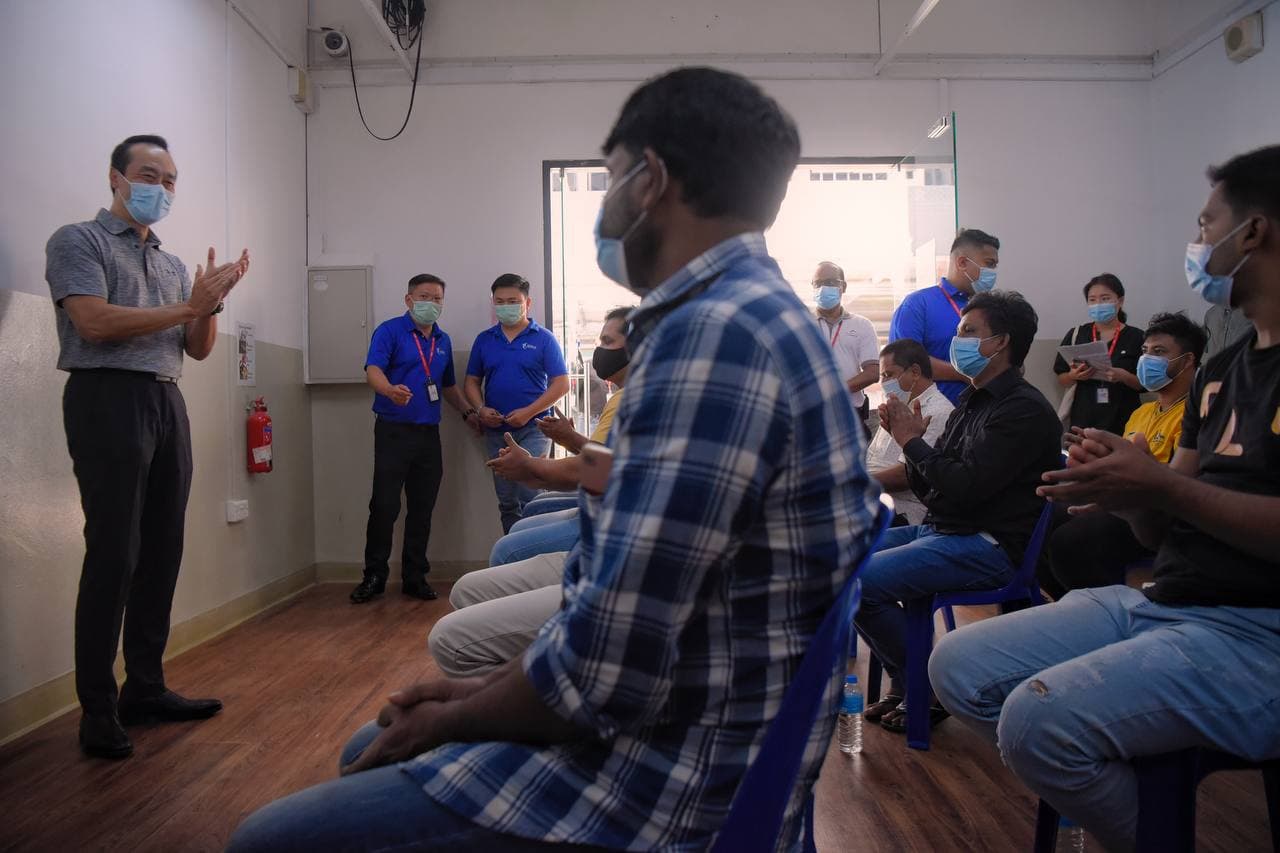SINGAPORE - A pilot programme allowing migrant workers in dormitories to go back into the community is set to begin next week - nine months after the scheme was first announced in December last year and more than 16 months after movement curbs were first imposed.
For a start, up to 500 fully vaccinated migrant workers living in dorms that have had no Covid-19 cases in the previous two weeks will be allowed to visit pre-identified locations in the community for up to six hours each week.
These dorms will also need to have good safe living measures in place and must have a 90 per cent vaccination rate, said the Ministry of Manpower (MOM) on Thursday (Sept 9).
More than nine in 10 migrant workers living in dorms are fully vaccinated but The Straits Times understands that some dorms have not met the required vaccination rates.
The first identified location for the pilot scheme is Little India.
Workers will be required to take an antigen rapid test (ART) before the visit and three days after the visit.
MOM will evaluate the pilot scheme after a month to see how it can safely expand its scope and scale.
ST understands that workers keen on visiting the community will need to apply to be part of the pilot scheme.
Dedicated bus transport will provided by MOM or the dorm operator to and from Little India.
The scheme will be open to all dorms that meet MOM's criteria, but it is not clear yet how interested workers will be selected or split into cohorts.
Workers will be restricted to an area within Little India, but the ministry did not specify where and how big this area will be.
It also did not say how it plans to ensure that workers do not leave the stipulated area during the visits.
More details are expected to be announced next week.
The ministry will also be easing other restrictions from next Monday. This is the same day that a new mandatory self-testing regimen for workers living in dorms is also set to begin.
As part of this new regimen, workers will need to regularly test themselves using ARTs. This is in addition to the rostered routine testing they are subjected to every seven or 14 days.
From next Monday, all migrant workers will also be allowed visit their designated recreation centre twice a week, up from once a week currently.
MOM said it will work with non-governmental organisations (NGOs) to introduce activities such as movie screenings, sports events and religious services.
Workers will be allowed to visit the recreation centres within 48 hours of a negative polymerase chain reaction (PCR) test or within 24 hours of a negative ART.
Workers who are looking to visit the recreation centres for a second time in the same week outside of their regular testing window can do so with a negative ART result. This additional test can be done at the recreation centre.
Excursions to local attractions organised by NGOs will also be allowed to resume. Participants must take pre-event tests.
Speaking to the media on the sidelines of a visit to Westlite Mandai dormitory, where a cluster of 14 cases was recently closed, Senior Minister of State for Manpower and Health Koh Poh Koon said the initial plan is to have workers visit Little India on Wednesdays, Saturdays and Sundays over two time slots in the morning and afternoon.
About 80 workers will be allocated to each time slot.
"With this, we think the group size is manageable. There will be no overcrowding in Little India itself, and together with the volunteers and the NGO partners who have worked closely with us on this, I think we can manage their interaction within a community in a small area appropriately," Dr Koh said.

The pre- and post-visit ARTs will allow the authorities to pick up any Covid-19 cases and allow it to better understand how the pilot scheme will benefit workers without risking the virus spilling out into the community or back into the dorms, he added.
There will not be fixed itineraries for the community visits. One possibility would be to have workers go to religious sites first before allowing them to visit shops and eateries freely within the designated area.
"I would imagine that in the beginning part... they might all want to go to the mosque or to the temple," said Dr Koh, adding that MOM will work with the mosque and temple management to segregate these workers from other devotees.
"They have a little bit of flexibility there to also meet up with people they want... l think that degree of freedom is important for them to actually de-stress."
Dr Koh said MOM has also been working closely with the Little India Shopkeepers and Heritage Association (Lisha) to keep workers safe, but he did not specify what role Lisha will play in the pilot scheme.
He said the easing of restrictions on migrant workers comes at a time when the number of people in the larger community vulnerable to Covid-19 is falling day by day as vaccination rates continue to rise.
"With vaccination, the severity of illness is actually low, the need for hospitalisation and oxygenation is low as well, so it is a bit of mindset shift for the community, and for the workers' dormitories as well," he said, adding that the recent clusters linked to dorms have borne this out.
Barring a "black swan event" such as a new, more virulent strain of the coronavirus, the community visits for migrant workers will likely continue even if they result in a few new infections.
Dr Koh added: "We can probably manage the risks because the workers' dormitories already have good segregation (measures), so we will then be able to make sure that they are safely managed in the dorms or in the quarantine facilities without having to necessary abolish the (pilot) completely and lock down all the dorms again."
He said the high vaccination rate has provided a degree of baseline protection, which will be enhanced by third booster shots for the community, and possibly for migrant workers as well.
"All this will give us a better footing to say that we want to move in one direction and not have to make U-turns back if we can help it."


